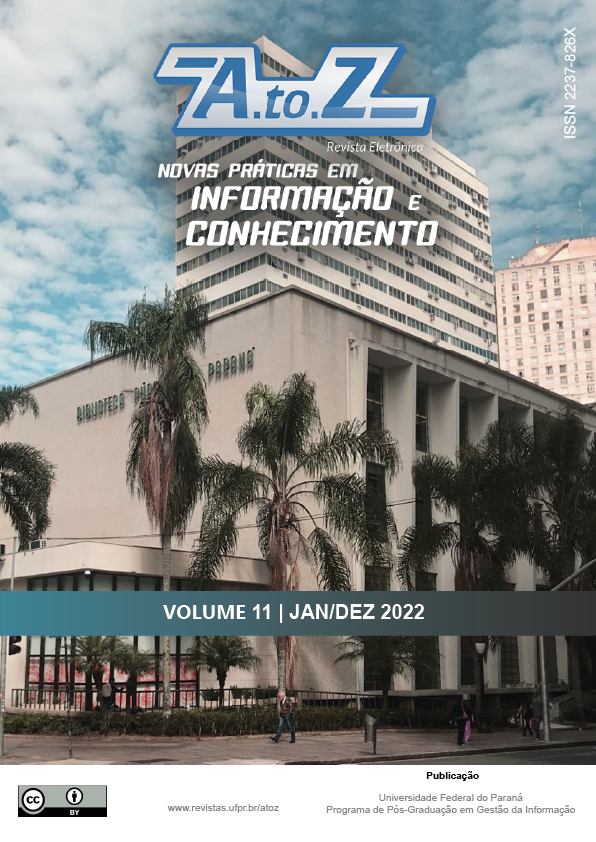Integridade na Pesquisa no âmbito da conjuntura pandêmica de COVID-19: um mapeamento bibliométrico
DOI:
https://doi.org/10.5380/atoz.v11i0.84325Keywords:
Ética na pesquisa, pandemia de COVID-19, Bibliometria, Integridade científica, Produção científica.Abstract
Introdução: apresenta um mapeamento bibliométrico sobre o tema “integridade na pesquisa” com foco nas discussões da produção científica publicada no âmbito do cenário originado pela pandemia de COVID-19. Método: os dados para este estudo bibliométrico, de natureza exploratória quanto aos fins, e quali-quantitativa quanto aos métodos, foram coletados em 08 de dezembro de 2021 na base de dados Scopus, contemplando artigos publicados de 2020 até a data do levantamento. Na condução da estratégia de busca foram incluídos sinônimos para “integridade científica” e para “COVID-19”. Resultados: publicados em 78 diferentes periódicos, os 106 artigos que compuseram o corpus da pesquisa compreenderam 128 assuntos associados ao tema de análise. Somados, esses artigos acumulam 1.018 citações, revelando também o interesse da comunidade no tema em pesquisas subsequentes. Duas principais frentes de pesquisa foram percebidas no mapeamento: a primeira, direcionada a desafios éticos no campo da saúde, da pesquisa clínica, médica e biomédica, e a segunda, relacionada a vulnerabilidade trazida pela pandemia em curso, que deu margens a mudanças em processos de revisão por pares, que, consequentemente possibilitaram a publicação (e a posterior retratação) de pesquisas imprecisas, defeituosas e com baixo rigor metodológico, trazendo prejuízos ao sistema da comunicação científica, como também influenciando opinião pública a partir da divulgação de casos de má conduta. Conclusão: identifica que a promoção da integridade na pesquisa, por meio da publicação de artigos no tema, tem sido parte da agenda de pesquisa ao redor do globo.
References
Babbage, C. (1830). Reflections on the Decline of Science in England, and on Some of Its Causes. London: B. Fellowes.
Bramstedt, K. A. (2020). The carnage of substandard research during the COVID-19 pandemic: a call for quality. Journal of Medical Ethics. 46, 803-807. doi: 10.1136/medethics-2020-106494
Chenneville, T., & Schwartz-Mette, R. (2020). Ethical considerations for psychologists in the time of COVID-19. The American psychologist, 75(5), 644-654. doi: 10.1037/amp0000661
Custers, R. (2015). The promotion of correct research. Recuperado de https://set.kuleuven.be/events/ethiekweek/2015/integriteit-1/presentatie-custer
Dinis-Oliveira, R. J. (2020). COVID-19 research: pandemic versus “paperdemic”, integrity, values and risks of the “speed science”. Forensic Sciences Research 5(2), 174-187. doi: 10.1080/20961790.2020.1767754
Else, H. (2020). How a torrent of COVID science changed research publishing -in seven charts. Nature. 588, 553. doi: 10.1038/d41586-020-03564-y
Goodman, J. L. &, Borio L. (2020). Finding Effective Treatments for COVID-19: Scientific Integrity and Public Confidence in a Time of Crisis. JAMA. 323(19), 1899-1900. doi:10.1001/jama.2020.6434
Goodstein, D. (1991). Scientific fraud. American Scholar. 60(4), 505.
Gonzalez de Gómez, M. N. (2015). Validade científica: da epistemologia à política e à ética. Liinc em revista. 11(2), 339-359. 2015. doi: 10.18617/liinc.v11i2.816
Jha, A. (2012). False positives: fraud and misconduct are threatening scientific research. Recuperado de: https://www.theguardian.com/science/2012/sep/13/scientific-research-fraud-bad-practice
Jesus-Silva, S. G., & Antonio, A. C. P. (2021). Research integrity in times of pandemic. Rev Cienc Saúde. 11(3), 3-5. doi: 10.21876/rcshci.v11i3.1220
Jia, Y., Chen, O., Xiao, Z., Xiao, J., Bian, J., & Jia, H. (2021). Nurses’ ethical challenges caring for people with COVID-19: A qualitative study. Nursing Ethics, 28(1), 33-45. doi: 10.1177/0969733020944453
Kornfeld, D. S. (2012). Research Misconduct: The Search for a Remedy. Academic Medicine. 87(7), 877-882. Doi: 10.1097/ACM.0b013e318257ee6a
Meagher, K. M. (2020). COVID-19 Ethics and Research. Mayo Clinic Proceedings. 95(6), 1119-1123. doi: 10.1016/j.mayocp.2020.04.019
Mello, M. M., & Wang, C. J. (2020). Ethics and governance for digital disease surveillance. Science. 368(6494), 951-954. doi: 10.1126/science.abb9045
National Research Council (US) and Institute of Medicine (US) Committee on Assessing Integrity in Research Environments. 2002. Integrity in Scientific Research: Creating an Environment That Promotes Responsible Conduct. Recuperado de: https://www.ncbi.nlm.nih.gov/books/NBK208714/
Noack, A. (2009). Modularity clustering is force-directed layout. Physical Review E. 79, 026102. doi: 10.1103/PhysRevE.79.026102
Poff, D. (2014). Research Integrity. In: A C Michalos (Ed.) Encyclopedia of Quality of Life and Well-Being Research. Dordrecht: Springer. doi: 10.1007/978-94-007-0753-5_2486
Resnik D. B. (2019). Is it time to revise the definition of research misconduct?. Accountability in research, 26(2), 123-137. doi: 10.1080/08989621.2019.1570156
Rzymski, P. et al. (2020). Quantity does not equal quality: Scientific principles cannot be sacrificed. International Immunopharmacology. 86, 1-3. doi: 10.1016/j.intimp.2020.106711
Santos-d’Amorim, K., Melo, R. R., & Santos, R. N. M. (2021). Retractions and post-retraction citations in the COVID-19 infodemic: is Academia spreading misinformation? Liinc Em Revista, 17(1), e5593. doi: 10.18617/liinc.v17i1.5593
Scanff, A., Naudet, F., Cristea, I. A., Moher, D., Bishop, D. V. M., et al. (2021). A survey of biomedical journals to detect editorial bias and nepotistic behavior. PLOS Biology 19(11): e3001133. doi: 10.1371/journal.pbio.3001133
Townsend, E., Nielsen, E., Allister, R., & Cassidy, S. A. (2020). Key ethical questions for research during the COVID-19 pandemic. The Lancet Psychiatry. 7, 381-383. Doi: 10.1016/S2215-0366(20)30150-4
Van der Burght, S., & Bracke, N. (2018). Research Integrity. Recuperado em: https://www.kcgg.ugent.be/pdf/2018.05.25_K2C_%20Scientific_integrity.pdf
Whitmore, K. A., Laupland, K. B., Vincent, C. M., Edwards, F. A., & Reade, M. C. (2020). Changes in medical scientific publication associated with the COVID-19 pandemic. Med. J. Aust. 213, 496-499.e1. doi: 10.5694/mja2.50855
Wibawa, T. (2021). COVID-19 vaccine research and development: ethical issues. Tropical medicine & international health. 26(1), 14-19. doi: 10.1111/tmi.13503
Yeo-The, N. S. L., & Tang, B. L. (2021). An alarming retraction rate for scientific publications on Coronavirus Disease 2019 (COVID-19). Accountability in Research, 28(1), 47-53, doi: 10.1080/08989621.2020.1782203
Downloads
Published
How to Cite
Issue
Section
License
Atoz is a open access journal and the authors have permission and are encouraged to deposit their papers in personal web pages, institutional repositories or portals before (pre-print) or after (post-print) the publication at AtoZ. It is just asked, when and where possible, the mention, as a bibliographic reference (including the atributted URL), to the AtoZ Journal.
The authors license the AtoZ for the solely purpose of disseminate the published work (peer reviewed version/post-print) in aggregation, curation and indexing systems.
The AtoZ is a Diadorim/IBICT green academic journal.
All the journal content (including instructions, editorial policies and templates) - except where otherwise indicated - is under a Creative Commons Attribution 4.0 International, since October 2020.
When published by this journal, articles are free to share (copy and redistribute the material in any support or format for any purpose, even commercial) and adapt (remix, transform, and create from the material for any purpose , even if commercial). You must give appropriate credit , provide a link to the license, and indicate if changes were made
AtoZ does not apply any charges regarding manuscripts submission/processing and papers publication.



























